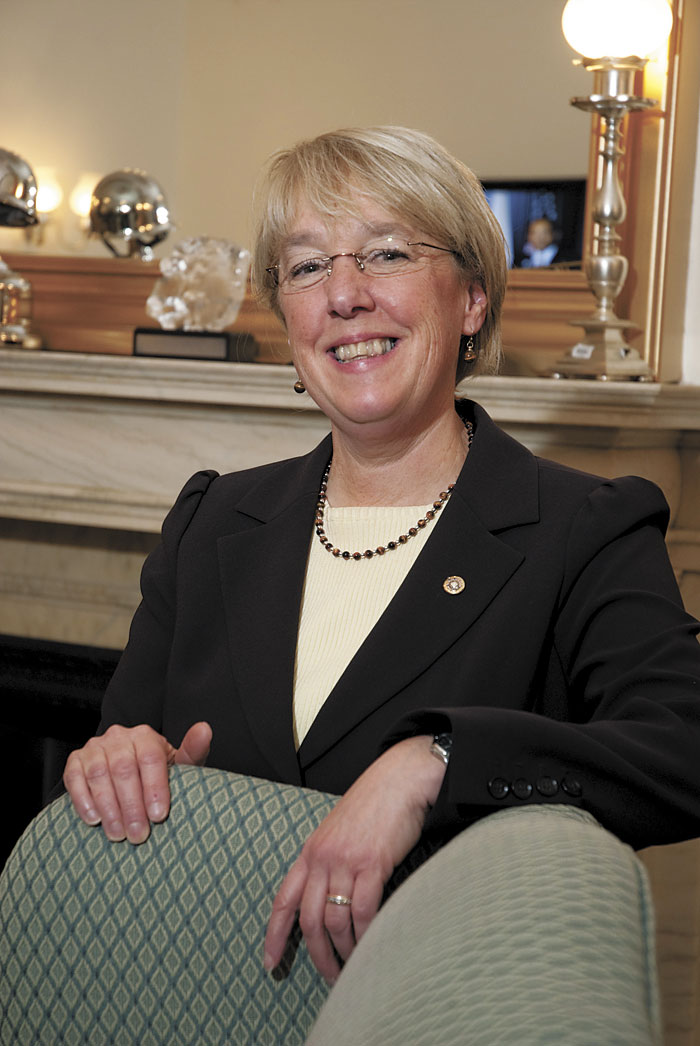Last fall, Propel Biofuels opened its first Seattle fueling station at Bernie’s Automotive in Ballard. The event drew the usual suspects: Propel CEO Rob Elam, Sen. Maria Cantwell, a canola farmer from eastern Washington, and Duff Badgley, head of One Earth, a locally-based group dedicated to fighting climate change. At the opening, Badgley, who thinks biofuel isn’t sustainable unless it’s made from recycled vegetable oil, let it be known he was highly suspicious of what constituted the biodiesel coursing through Propel’s bright green pump.
In the months that followed, Badgley—who until his primary loss was a Green Party candidate for governor—began showing up every few weeks at the Ballard Propel station with other members of One Earth and a banner reading “Biofuel = Crimes Against Humanity.” But they didn’t stop there: Elam says that One Earth protesters have been approaching customers—particularly women—and harassing them while they fill up, and that this practice has spread to another recently-opened station on West Mercer Street. Here, the One Earthers hand out leaflets charging biofuels with being a “scourge on humankind,” and allegedly take photos of customers and their license plates.
“Crimes against humanity, really?” says Elam. “In all likelihood, this is the most sustainable and local fuel that’s been available. This intense hostility is against something that doesn’t exist…Where it crosses the line is when he starts intimidating customers.” (In actuality, it’s pretty tough to find a Propel customer to harass these days. Recent hour-long visits to Propel’s South Lake Union and Ballard stations yielded just one customer in toto: Heather Andersen, who insists protesters won’t scare her away.)
Like his protests, Badgley’s beef with biodiesel has evolved. Initially he was concerned about only biodiesel made with palm oil—which some feel contributes to the destruction of rain forests—and questioned whether one of Propel’s sources, Imperium Renewables of Grays Harbor, was importing its oil from Malaysia. Now Badgley’s against all “crop-based” biodiesel, meaning soy, canola, and pretty much anything not made from recycled oil.
Badgley argues that soy and canola seed, although grown in North America, contribute to rain forest destruction because the growing demand for biodiesel encourages farmers to plant in more tropical locations. Badgley also claims soy and canola grown for fuel are displacing acreage farmed for food, and therefore contributing to rising prices and hunger worldwide. Meanwhile, Elam says Propel, which has six stations in Washington and plans to expand into Oregon and California, gets its fuel from canola seed grown in Washington and Canada.
Elam argues that there’s no evidence the U.S. is shorting the world’s food supply by growing crops for fuel. Plus, he says, biofuel consumption isn’t responsible for the rise in commodity prices. Prices are going up in every sector, Elam argues, adding that pinning the blame on biodiesel is “a total red herring.”
In an attempt to stymie the efforts of One Earth and Badgley, Propel recently wrote him a letter warning that any future shenanigans on company property will result in the filing of an antiharassment order in District Court. But Badgley, who as of last week’s count had 9,636 votes in the gubernatorial primary, maintains that he only protests from the sidewalk—and insists he’s never photographed or threatened anyone.
“I think Rob’s upset because we’re speaking the truth,” he says. “Our protests are legal. They’re peaceful.”
In order to prove that Badgley and his cronies have been hectoring customers, Elam and sales director Michael Kudriavtseff set out with a video camera, a la Cops, on July 31. They arrived after Christina Sylvester, Propel’s director of logistics and customer service, had been approached earlier that day by two men while visiting the South Lake Union pump. She claims one of them took a picture of her license plate with his cell phone. The men backed off, she says, when she told them she worked for Propel.
The video shows two men standing in front of the pumps. On this day, there’s no “Crimes Against Humanity” banner, but Badgley, pulling a small wheeled suitcase, is clearly present—and clearly on Propel property, not the sidewalk. Badgley remembers the incident, but insists he took no pictures, though he says he “can’t speak for anyone else.” He also says Elam was “belligerent” and threatened them.
Elam says this is yet another of Badgley’s lies: “You’ve seen the rhetoric this guy uses. He calls the product we sell a crime against humanity. He has absolutely zero credibility.”
Nikola Davidson, program director for the Northwest Biofuels Association, says Badgley and his protests have been “escalating out of control.”
“It’s unfortunate,” she says. “Propel brought all of this positive momentum and built a beautiful station [in South Lake Union]. I feel [One Earth’s behavior is] so misplaced. How come petroleum gets a free pass and people just tear apart biofuels?”
Even Dan Freeman, the owner of Dr. Dan’s Biodiesel, who’s long been dubious of Propel (in part because they opened up just a few blocks from his Ballard shop), says things have gone too far. “The protesters have some very good points,” says Freeman. “But we all need to get along and treat each other fairly, and be civil.”
Freeman says some of his customers have also been “verbally assaulted” on the street by random protesters. “They see a biodiesel sticker on someone’s VW and scream at them that they’re killing Mexicans,” he laments. “If we can learn to express ourselves appropriately, people are more likely to listen.”
Freeman, who sells fuel made from Iowa-grown soy, is also incredulous about Badgley’s “crop-based” standard. “What does that mean? I guess it’s just that he doesn’t want us to use any fuel—period.”






